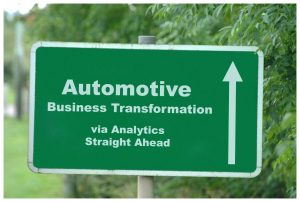It's an exciting time to be in the automotive and transportation industry. The opportunities for business transformation and growth are enormous – and those companies that lead in implementing new ways to drive intelligent customer interactions will capture the greatest share of new revenue streams.
 For those of us fortunate enough to attend the Automotive Analytics Executive Forum recently, we heard from industry leaders on critical topics shaping the industry. Topics such as the automotive revolution, the state of the economy, the future of automotive retail, the connected vehicle and smart mobility, and big data as an enabler.
For those of us fortunate enough to attend the Automotive Analytics Executive Forum recently, we heard from industry leaders on critical topics shaping the industry. Topics such as the automotive revolution, the state of the economy, the future of automotive retail, the connected vehicle and smart mobility, and big data as an enabler.
At the onset, I shared SAS’ point of view on the opportunities for new business models and innovation built on the connected vehicle, and explored key questions for organizations looking to successfully lead with leveraging analytics as the key enabler and differentiator for growth.
Global mega-trends can radically change the mobility industry
McKinsey’s Sven Beiker and Hans-Werner Kaas presented their perspective on the automotive revolution. It's a compelling view on how disruptive automotive technology-driven trends (connectivity, diverse mobility, autonomous driving, and electrification), driven by global mega-trends, are creating tremendous growth opportunities for automotive OEMs and suppliers.
It’s clear that we need to prepare for uncertainty on the road ahead. For incumbents, partnerships, collaboration, and software fueled innovation needed to drive transformational change in order to reshape the value proposition.
Consumer spending still holding strong
During the Chief Economist panel, Chad Moutray from NAM, Sue Yingzi Su from GM, and Bryan Bezold from Ford shared their expert views on a variety of issues. While all three saw consumer spending as still holding strong, Chad highlighted it could be an even brighter spot were it not for uncertainty on political issues. There was provocative discussion around the impact on miles driven (which are on the rise), disruptive innovation, electrification and autonomous vehicles, and the implications for scrappage rates and quality of vehicles as we look ahead to a future with increased car sharing.
The future of automotive retail is now
Are you surprised to know that the average consumer checks their mobile device over 150 times a day? That 50% of their queries for information originate from mobile? Google’s Peter Leto highlighted lessons to avoid from companies that did not spot changing trends. He further outlined the three trends guiding consumer behavior: time, transparency and technology. It’s clear that analytics has a key role in not just understanding human behavior, but influencing it to drive the best interactions.
Advances in connected vehicle platforms enable far greater insights and interactions
Experts in the connected vehicle space, Andreas Mai from Cisco, Scott McCormick from the CVTA and Gary Streelman from Magneti Marelli, provided unique insights on opportunities for the future. Advances in connectivity, ADAS (advanced driver assistance systems), autonomy and Mobility as a Service will accelerate – but will historical “industry penny pinching” hold us back from innovating at the pace that technology is moving?
If 63% of customers won’t buy a vehicle that doesn’t have the technology they want – it begs the question as to whether you understand those needs? Are we ready to capitalize on the convergence of 4G and 5G coming to push a great deal of work to the cloud? These and many other key questions were raised by the panelists.
The connected vehicle is driving a data and analytics revolution
Next up, we heard from Kevin Cooper on Ford Smart Mobility, and Gyasi Dapaa on Navistar’s use of analytics. With the average consumer spending 900 hours per year in the vehicle, auto OEMs have a great opportunity to enhance customers experience in and out of the vehicle – and with other multiple modes of transportation.
Leaders will understand their customers and act in a meaningful way on their behalf. In Navistar’s case, they are using data to empathize with their customers – enabled by new vehicle use clusters gleaned from connected vehicle data and analytics. They are poised to change how they interact with clients, while also speeding emerging issue detection and developing predictive models for detecting the probability of failure.
Delivering data-driven automotive transformation
The day concluded with a view from Grant Bodley, with HortonWorks, on driving actionable intelligence at the intersection of data in motion and data at rest. He cited multiple case studies and examples with respect to IoT, connected manufacturing and predictive maintenance, predictive warranty, usage-based insurance and high performance analytics in Hadoop.
Let’s work together to accelerate the pace of change
It’s clear from this forum and other recent events we’ve held with the industry, along with countless conversations I've had with our customers, that the value creation and business transformation opportunities are enormous. By leveraging the ecosystem of analytics, big data, connected technology, thought leadership, and consulting services, we as an industry have the opportunity to move much faster. I believe we’re up to the challenge, and look forward to the road ahead working together with all of you to change how the world moves.
